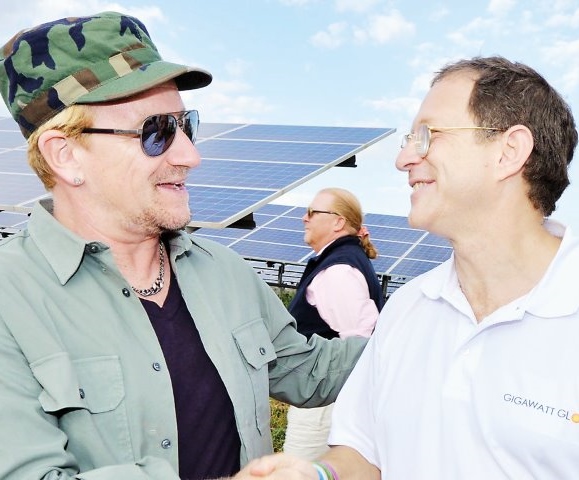
SA

‘Captain Sunshine’ helps Africa go solar
STEVEN GRUZD
Abramowitz, a student activist in Boston in the 1980s, fought to free Soviet Jewry and against the apartheid regime, and was threatened with expulsion by his university.As head of the World Union of Jewish Students, he called for sanctions and disinvestment on a trip to South Africa in 1987. He narrowly avoided deportation, earning a banning order (which he proudly framed and hung on his wall). He’s also been a journalist, an educator, and ran (unsuccessfully) for the Knesset for the Atid Echad party in 2006.
Abramowitz was shocked that Israel wasn’t running on solar energy when his family made aliyah in 2006 to Kibbutz Ketura, situated in the scorching southern Arava Desert.
He recalls, “With the sun setting over the Jordanian mountains and the tremendous heat in the desert in August, I said ‘this whole place works on solar power, right?’”
Wrong. At the time, Israel was 100% dependent on fossil fuels: coal, gas from Egypt, and over-used diesel generators. It was a heavy polluter, with electricity solely supplied through a state-owned company.
“It was nuts – this world leader in tech had no solar power!”
He resolved to take on the Israeli establishment to change this. “I was called crazy, and a naïve American kibbutznik,” he said. “I thought, ‘Hey, I helped get Hebrew teachers out of Siberia and helped to get sanctions imposed on apartheid South Africa. Can’t we change a few laws in our own country?’”
With trusted business partners, he had to overcome political, statutory, regulatory, and financial hurdles. “It took five years to win 100 out of 100 battles and raise capital in the midst of the global financial crisis… but I love beating up government for a good cause.”
In 2011, his company, Arava Power, brought online the Middle East’s first utility-scale solar field (the size of about nine rugby pitches), adding 4.9 megawatts to Israel’s electricity grid. Arava Power built another 12 fields in the south, costing $400 million (R5.6 billion). “We could have said dayenu at that point (it would have sufficed),” he said.
But now, due to Abramowitz’s chutzpah, the entire Arava is on course to be powered by the sun during daytime by 2020. He was named as one of CNN’s six global “green pioneers” in 2012, and has been nominated for the Nobel Peace Prize.
Witnessing this success, African entrepreneurs and politicians clamoured for Israeli solar tech. Abramowitz launched a new company, Energiya Global, to replicate and adapt the Israeli model internationally.
Again, the naysayers said this would never work due to patronage and corruption in Africa. Nevertheless, after careful research, Rwanda was selected as the pilot country.
Abramowitz said Energiya Global adopted a “quadruple bottom line” approach to solar investments in Africa. It had to make double-digit returns for investors, protect the environment, alleviate hardship, and enhance the reputation of Israel and the Jewish people.
By 2014, an 8.5 megawatt solar field was supplying 8% of Rwanda’s total power needs, dropping diesel consumption by 10%.
Rwanda’s solar success happened right before the Paris climate talks in 2015. This made the case powerfully for solar in Africa, with a proven business model that could operate at scale. “Rwanda delinked GDP growth from emissions growth – we added 8% to the grid without emissions. Mine was virtually the only kippah among 40 000 people. I spent two weeks in Paris being hugged non-stop by African officials,” said Abramowitz.
Abramowitz will be in Pretoria next week for a meeting of Power Africa, an Obama-era mega-initiative now recalibrated for the Trump administration. It has to promote American jobs, empower women, deploy in frontier markets to counter jihadism, and help the United States compete with China in Africa.
Abramowitz despairs that “South Africa built two monster coal-fired plants, and the planet lost out. South Africa is blessed with sunlight, waves, wind, and bio-waste. A progressive carbon tax would allow the country to switch to a 21st-century grid… but corruption and bad leadership in government and Eskom have put South Africa behind the eight ball. It’s not a good global green citizen.”
The reluctance to embrace Israeli technology and innovation openly by the South African government in order to score political points in the Israel-Palestinian conflict, saddens Abramowitz.
He said South Africa was blocking Israel’s attempts to regain observer status at the African Union (lost when the institution reformed in 2002). “The ANC [African National Congress] is sometimes more radical than Israel’s Arab neighbours, and the Palestinians themselves.” Initial discussions with Pretoria and Eskom about building a giant solar field in Upington went nowhere.
Abramowitz believes that with the right policies, technology, and incentives, especially allowing more players to supply electricity, by 2030, South Africa could achieve 100% daytime solar energy usage. This would take massive investment in energy storage and transmission lines. If only it would let Israel in.





Donald SILVERMAN
May 21, 2019 at 7:44 pm
‘Steven: Nice article. You added to my nachos (not the Mexican chips) writing about my son-in-law. Peace’